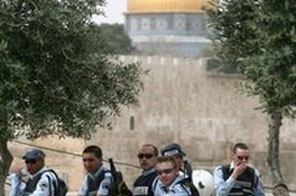Israel keeps restrictions on Jerusalem mosque access
JERUSALEM: Israeli police on Monday maintained restrictions on access to the Al-Aqsa mosque compound -- Islam's third holiest site -- for the fourth day running amid tensions in Jerusalem.
Authorities fear renewed clashes could follow the formal reopening of a landmark synagogue in Jerusalem's walled Old City, in mainly Arab east Jerusalem.
"Considering the risk of trouble, we maintain the state of alert and restrictions on access to the Temple Mount," said police spokesman Micky Rosenfeld, using the Jewish name for the site.
Since Friday, men under the age of 50 and non-Muslims have been barred from entering the compound.
The compound housing Al-Aqsa and the Dome of the Rock is Islam's third holiest site after Mecca and Medina in Saudi Arabia.
It is the holiest site for Jews because the Second Temple stood there before it was destroyed by the Romans in 70 AD.
Police clashed with protesters at the compound on March 5 and again last Friday.
Tensions have spiralled following Israel's announcement that it will build 1,600 new homes for Jewish settlers in mostly Arab east Jerusalem, which Israel occupied in the 1967 and annexed in a move not recognised internationally.
The Palestinians, who view east Jerusalem as the capital of their future state, have decided to hold a two-hour strike in the city, and the reopening of the 17th century synagogue could worsen tensions.
Many Palestinians view Israeli projects near the flashpoint site as an assault on its tense status quo or a prelude to the building of a third Jewish temple there.
"This is no mere synagogue," said Hatem Abdel Qader, the official in charge of Jerusalem affairs for Palestinian president Mahmud Abbas's Fatah movement.
"This synagogue will be a prelude to violence and religious fanaticism and extremism, and this is not limited to Jewish extremists but includes members of the Israeli government," he added.
The Hurva synagogue was built in 1694 and destroyed by Ottoman authorities 21 years later. It was rebuilt in 1864, then blown to pieces in 1948 as troops of the newly established state of Israel battled Jordan for control of the city.
Israel has also extended a lockdown on the occupied West Bank that started on Friday.






